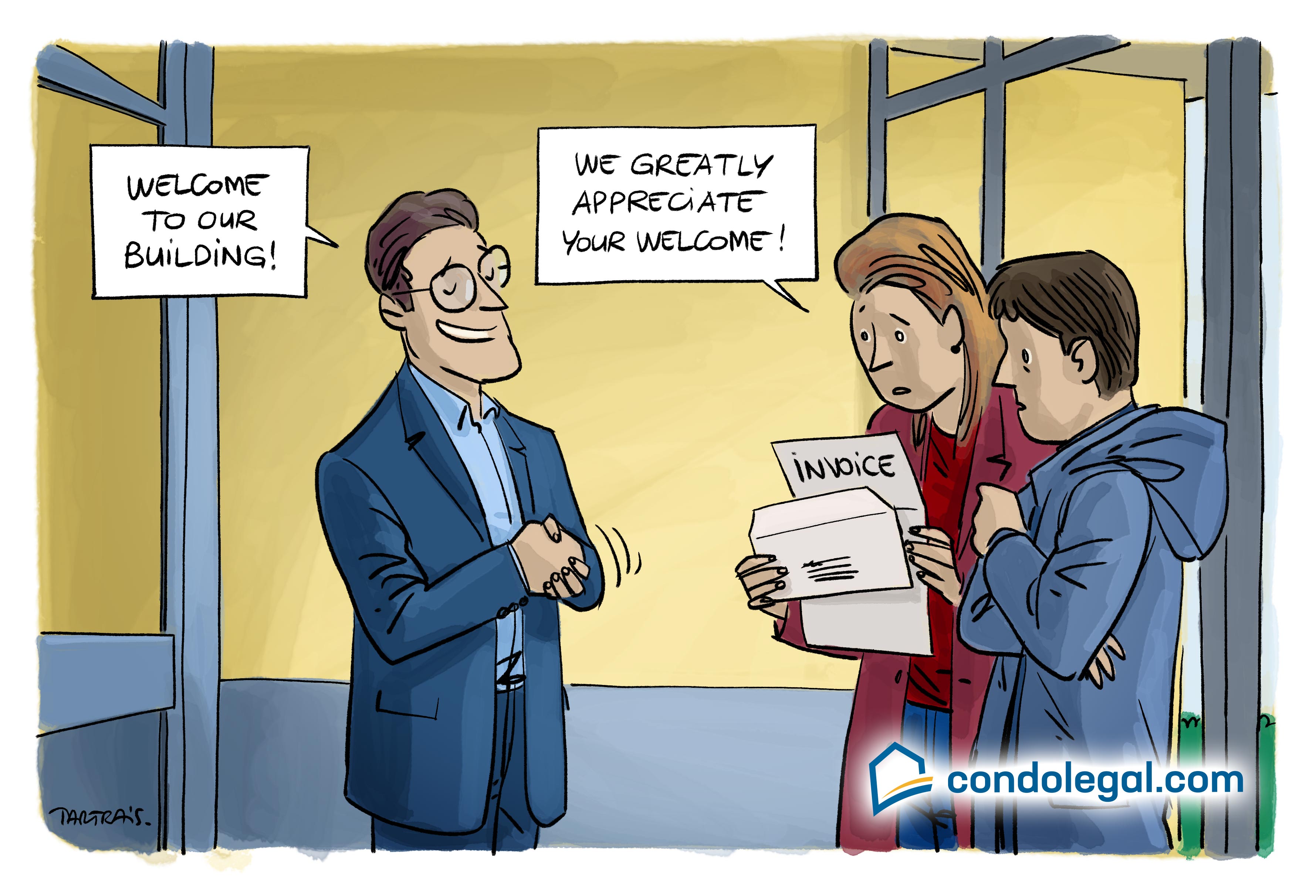 Before buying the apartment of your dreams, find out about the status of the common expenses associated with it, especially those that may have remained unpaid by the seller. Common expenses, better known as " condo fees", which you will have to pay once you become a homeowner, are an essential component to consider. They correspond to the current expenses that you will have to pay regularly for the operation, the administration of the co-ownership and the maintenance of the common portions. Each co-owner participates and generally pays them at the beginning of each month.
Before buying the apartment of your dreams, find out about the status of the common expenses associated with it, especially those that may have remained unpaid by the seller. Common expenses, better known as " condo fees", which you will have to pay once you become a homeowner, are an essential component to consider. They correspond to the current expenses that you will have to pay regularly for the operation, the administration of the co-ownership and the maintenance of the common portions. Each co-owner participates and generally pays them at the beginning of each month.
Common charges
The common expenses constitute the amounts of money required from the co-owners by the syndicate to meet the expenses arising from the co-ownership and the operation of the immovable, as well as the amounts to be paid into the contingency fund and the self-insurance fund. There are two main categories of charges: general common expenses relating to the administration, conservation and maintenance of the common portions and particular common expenses The participation of each co-owner varies according to the nature of the charges. The participation of each co-owner varies according to the nature of the charges. When these common charges are low, they can be the reflection of poor management of the co-ownership with poor maintenance of the building and an insufficient contingency fund. It is therefore necessary to remain vigilant and be wary of what may seem too nice.
The provisional budget
The common expenses are the backbone of the provisional budget of a co-ownership, because they create the financial basis. However, this budget must meet the necessary financial needs, so that a syndicate of co-owners can maintain and preserve the building adequately. It will only be able to play its role properly if it is well thought out. Judicious budget planning will necessarily involve taking into account all the current expenses of a co-ownership. More particularly those inherent in the maintenance of real estate and the administration of common portions.
The budget must also allow the financing of major future work, namely the repairs and replacements of common portions that have expired. The contingency fund is undoubtedly the most important position to be filled, because it is on it that the realization of this work of paramount importance will depend. The calculation method recommended to develop it can be questioned. If necessary, do not hesitate to contact the members of the Board of Directors of the syndicate on this issue. They should normally give you the right time.
The insurance premiums and deductibles of a co-ownership represent another component not to be neglected in the budget. These have increased sharply in many co-ownerships in recent years. The causes are multiple: increase in claims, increased water damage, water proofing problems and aging of the building.
The state of the co-ownership's finances
When you buy in co-ownership, you do not only acquire an apartment, you also join a group of co-owners responsible for the accounts of the entire building. Also, it is necessary to be very careful and to check upstream the state of the finances of the co-ownership and its good management. To do this, ask for his accounts and check in particular the item "co-owners debtors". If the latter are numerous, it means that the cash flow is weakened and the co-ownership may not be able to cope with the necessary work.
Unpaid invoices
Before buying, it is essential to ask the syndicate of co-owners if the seller still owes sums of money for the common expenses. This request can also be submitted by your real estate broker or the notary responsible for receiving the deed of sale. A member of the board of directors of the syndicate or the condo manager, must respond in writing within 15 days, after informing the co-owner that such a request has been sent to him. After this period, you are not responsible for the payment of these sums.
If you fail to do this verification, you will be required, once you become the owner, to pay with interest on all common expenses due in respect of the newly acquired fraction. You will be able to withhold part of the sale price to pay directly to the syndicate of co-owners.
 WHAT YOU SHOULD KNOW! For marketing reasons, some developers show unrealistic operational budgets to potential purchasers. Many directors also use this ploy to be elected at the next general annual meeting of the co-owners. Do not be fooled by empty speeches and reassurances. Be aware! Be sceptical of anything that is too good to be true and proceed to your own due diligence!
WHAT YOU SHOULD KNOW! For marketing reasons, some developers show unrealistic operational budgets to potential purchasers. Many directors also use this ploy to be elected at the next general annual meeting of the co-owners. Do not be fooled by empty speeches and reassurances. Be aware! Be sceptical of anything that is too good to be true and proceed to your own due diligence!
 WHAT TO KEEP IN MIND: Insufficient or inexistent contingency funds are the result of commons expenses that are too low or even nominal. Sooner or later, reality will prevail and haunt the community of co-owners, which will become the victim of drastic increases to their common expenses. These unpopular decisions cause the deterioration of the atmosphere and social cohesiveness of the co-ownership, which generate conflicts between divided co-owners. On the one side, you will find those in favour of the work to be carried out, and on the other side, you will find the co-owners that do not have the financial means to meet their obligations.
WHAT TO KEEP IN MIND: Insufficient or inexistent contingency funds are the result of commons expenses that are too low or even nominal. Sooner or later, reality will prevail and haunt the community of co-owners, which will become the victim of drastic increases to their common expenses. These unpopular decisions cause the deterioration of the atmosphere and social cohesiveness of the co-ownership, which generate conflicts between divided co-owners. On the one side, you will find those in favour of the work to be carried out, and on the other side, you will find the co-owners that do not have the financial means to meet their obligations.
 WARNING! Some co-ownerships proceed with “special assessments” to pay large invoices, such as those for the insurance policies. Many co-owners support this approach based on the pretext that it facilitates the resale of the condos. Avoid these unnecessary assessments by analyzing carefully the operational budget of the co-ownership. If you find that this is the practice in the immovable, we recommend that you seek to buy elsewhere, as this attitude often indicates an unethical approach to the management of a co-ownership.
WARNING! Some co-ownerships proceed with “special assessments” to pay large invoices, such as those for the insurance policies. Many co-owners support this approach based on the pretext that it facilitates the resale of the condos. Avoid these unnecessary assessments by analyzing carefully the operational budget of the co-ownership. If you find that this is the practice in the immovable, we recommend that you seek to buy elsewhere, as this attitude often indicates an unethical approach to the management of a co-ownership.
Return to the super file Condominium Shopping Guide




